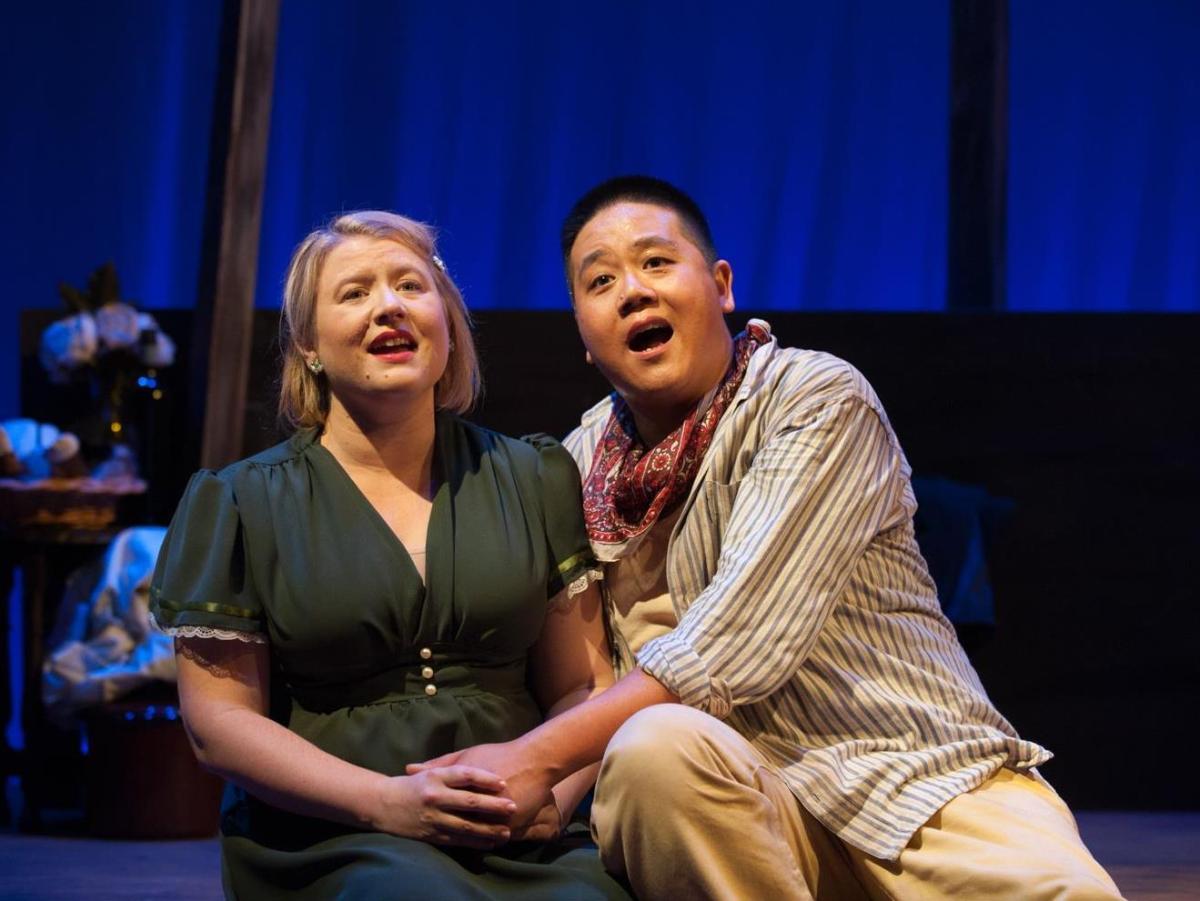Emily Uhlrich and Henry Choo. Image by Sarah Walker.
Specialising in operas rarely performed in Australia, Lyric Opera of Melbourne began their 2014 season with Aaron Copland’s only full-length work for the stage, The Tender Land. Inspired by Walker Evan’s Depression-era photographs of America and James Agee’s Let Us Now Praise Famous Men, Copland set his opera on a farm in the Midwest of the United States.
Originally commissioned for the National Broadcasting Commission Television Opera Workshop, it was later rejected, finally having its premiere at the New York City Opera in 1954. Various reasons are offered as to why the opera was not a critical success. These included the setting, a thin plot and a loss of impact due to transferring a work that had been conceived for the intimate medium of television to a large opera house.
In the main theatre of Chapel off Chapel any concerns regarding intimacy are immediately addressed. Using the chamber version, arranged for thirteen instruments (with Copland’s permission) by the conductor Murray Sidlin, Lyric Opera’s production was certainly not short on impact. A simple set of corrugated iron, wood and straw stalks suggested a farmhouse porch and yard and fields ripe for harvest. It was as modest as the lives of the characters, who inhabit an environment that threatens poverty while offering the attractions of honest toil in close contact with the earth. Copland’s distinctive voice, perhaps at its most recognizable in his Appalachian Spring, is deeply lyrical with a special brand of romantic pastoral colour that celebrates nature, simple pleasures and a meeting of kindred spirits.
With the action restricted to less than twenty-four hours, The Tender Land is a coming of age story as Laurie Moss finds love and the promise of a better way of life on the eve of her graduation from high school. When two hungry drifters arrive looking for work, she is primed for a romantic liaison. Emily Uhlrich’s clear soprano conveyed both Laurie’s naiveté and her yearning to escape the stifling control of Grandpa Moss and a protective Ma Moss. Despite the negative aspects of her life and tensions arising from unsavoury strangers in the district, the over-riding atmosphere of the opera is positive.
Laurie’s younger sister Beth, largely a speaking part, established a buoyant mood with her barefoot pleasure in dancing with her doll. Daniela Leska was a delightful Beth, exuding fresh-faced happiness. This same pleasure in small things was also the dominant feature of many of the other characters, finding its most vigorous expression in the dancing at Laurie’s graduation party. Part line dancing, part square dancing, Georgia Taylor’s choreography worked extremely well within a fairly confined space.
Caroline Vercoe also emphasized the more positive aspects of life on the farm in the initial scenes, giving a sympathetic portrayal of a nurturing parent. Although some lower passages were difficult to hear clearly, her rich voice and generally excellent diction were commendable. In fact all singers worked hard to present the words as clearly as possible, thankfully resisting any temptation to sing with an American accent. Doubtless this was another of the many wise choices of director John Kachoyan. As the grandfather, Tiriki Onus did his best to portray an irascible character decades older than himself. More comfortable in the higher register, his bass notes tended to be submerged by the orchestra.
Well matched in vocal quality and unexpectedly credible in appearance, Henry Choo and Raphael Wong gave strong performances as the suspicious drifters, Martin and Tom. They were also a good foil for each other, with Wong a lazy ex jailbird and Choo full of youthful ardour. So assured is Choo as a performer that he managed to eat a whole orange between bursts of song – very much the action of a hungry man. Choo’s ready smile and boyish charm made him a perfect candidate to play Romeo to Ulrich’s glowing Juliet. Their love duet as they called to each other and planned to elope was an absolute highlight. One of the most arresting vocal characteristics of both singers was their ability to sing beautiful soft high notes, making the most of Copland’s ravishing music in this scene. The opera is well worth seeing for this alone. It is ironic, however, that it was Martin who revelled in the smell of the land and the feel of the soil when Laurie was so keen to leave this pastoral idyll.
Although most of the music is for the five main characters, the larger ensembles are important contributors to a sense of people content with their lot and eager to take advantage of any opportunity to celebrate success. Enthusiastic, tuneful singing of this uplifting music, particularly ‘The Promise of Living’, was complemented by dramatic action full of vitality that made imaginative use of the space.
Copland’s score is far from straight forward, but Pat Miller managed his musical forces effectively. Unfortunately, without a pit of some description, it was occasionally difficult to achieve a satisfactory balance between orchestra and singers. It would have taken very experienced musicians indeed to achieve the refinement and subtlety needed to compensate fully for the lively acoustic, especially as Copland is less willing to accommodate the needs of singers than some other composers.
The Tender Land has a great deal to recommend it both in terms of Copland’s music and this production. We are fortunate that small opera companies around Australia, such Lyric Opera, are willing to take risks by mounting worthwhile unfamiliar works. Increasingly high standards are developing with increasing public support: an indication of a bright future.
Rating: 4 out of 5 stars
The Tender Land
Written by Aaron Copland
Presented by Lyric Opera of Melbourne
Chapel off Chapel, Little Chapel St
www.chapeloffchapel.com.au
2 – 10 May





